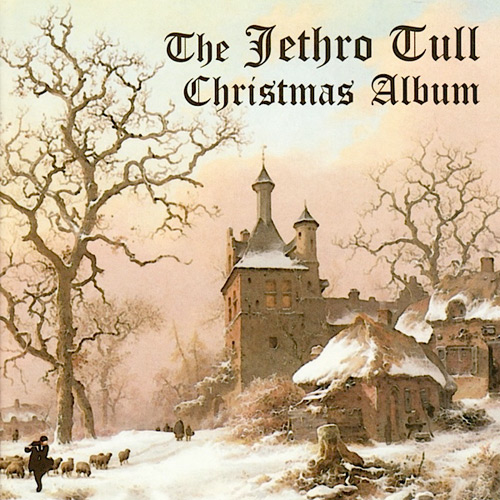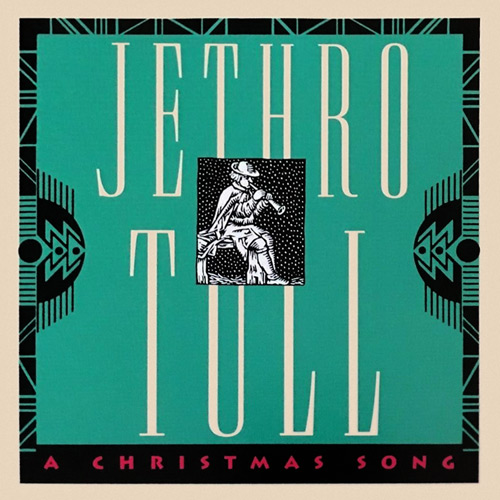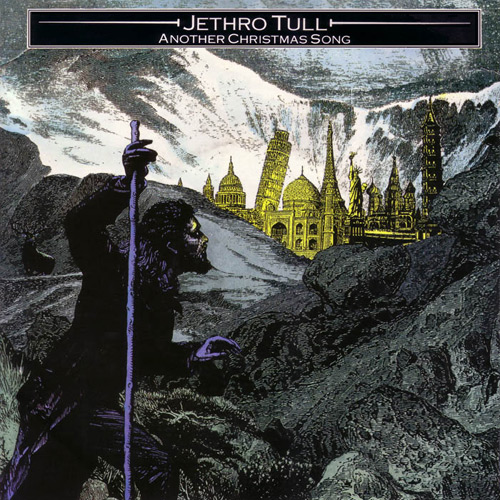
Jethro Tull
rock & roll
Support www.hipchristmas.com! ![]() Shop at Amazon, Apple Music, and more...
Shop at Amazon, Apple Music, and more...
 When The
Jethro Tull Christmas Album (Fuel, 2003) appeared in the record racks, my first
thought was, it's about time! Over the preceding 30-plus years - during which
the band had established themselves as one of England's premier progressive rock
bands - Jethro
Tull had recorded no less than three Christmas songs. That may not sound impressive,
but during the same time frame, most rockers (progressive or otherwise) recorded
absolutely none. During the 60's and 70's, you see, Christmas music was decidedly
out-of-fashion, especially for "serious" musicians like Jethro Tull.
For every Keith Emerson ("I Believe In Father Christmas") or Argent ("Christmas
For The Free"), there were dozens of bands that avoided the Yule like the
plague. Imagine "A King Crimson Christmas," and you'll see what I mean.
When The
Jethro Tull Christmas Album (Fuel, 2003) appeared in the record racks, my first
thought was, it's about time! Over the preceding 30-plus years - during which
the band had established themselves as one of England's premier progressive rock
bands - Jethro
Tull had recorded no less than three Christmas songs. That may not sound impressive,
but during the same time frame, most rockers (progressive or otherwise) recorded
absolutely none. During the 60's and 70's, you see, Christmas music was decidedly
out-of-fashion, especially for "serious" musicians like Jethro Tull.
For every Keith Emerson ("I Believe In Father Christmas") or Argent ("Christmas
For The Free"), there were dozens of bands that avoided the Yule like the
plague. Imagine "A King Crimson Christmas," and you'll see what I mean.
My point is, The Jethro Tull Christmas Album was never that unlikely, and, now realized, it sounds perfectly natural alongside their other music. The group's affinity for Christmas music probably arose from their affinity for folk music. Tull and their front man, singer, writer, and flutist Ian Anderson, always had more in common with progressive English folk bands like Steeleye Span or Fairport Convention than with spacey rockers like Yes or Pink Floyd. And, since so many Christmas songs have their roots in English folk music (think "What Child Is This" or "God Rest Ye Merry Gentlemen"), the leap into actual Christmas music was no doubt an easy one for Anderson and his band.
 Anyway, "A Christmas
Song" (1968) was the first Tull holiday ode, a quiet, acoustic song recorded
during the sessions
for This
Was, the group's very first album. Typical of Anderson's early work, "Christmas
Song" is dour - in this case a reminder (in Anderson's own words) that Christmas
is not an excuse to party. "Christmas spirit is not what you drink," Anderson
scolds, wryly concluding with the deathless line, "Hey Santa, pass us that bottle,
will ya?" Originally, "Christmas Song" served as the b-side for a non-LP single, "Love Story" (#29 UK, 1968). The song was later collected on Living
In The Past (1972) and served as the b-side for the popular American reissue of the 1969 title track. Much later it was collected on The
Best Of Jethro Tull: The Anniversary Collection (1993), and in 2001, it was appropriately
added to Fuel's CD reissue of This
Was.
Anyway, "A Christmas
Song" (1968) was the first Tull holiday ode, a quiet, acoustic song recorded
during the sessions
for This
Was, the group's very first album. Typical of Anderson's early work, "Christmas
Song" is dour - in this case a reminder (in Anderson's own words) that Christmas
is not an excuse to party. "Christmas spirit is not what you drink," Anderson
scolds, wryly concluding with the deathless line, "Hey Santa, pass us that bottle,
will ya?" Originally, "Christmas Song" served as the b-side for a non-LP single, "Love Story" (#29 UK, 1968). The song was later collected on Living
In The Past (1972) and served as the b-side for the popular American reissue of the 1969 title track. Much later it was collected on The
Best Of Jethro Tull: The Anniversary Collection (1993), and in 2001, it was appropriately
added to Fuel's CD reissue of This
Was.
"Ring Out Solstice Bells" was released as an EP in 1976 and then included on Songs From The Wood in 1977. Not surprisingly, it's way more fun than "A Christmas Song." First, it engenders a more celebratory air - even if it's celebrating a pagan winter ritual ("Seven druids dance," Anderson observes) rather than Christmas proper. Moreover, it sounds like the Jethro Tull of "Aqualung" and "Locomotive Breath" - sonically heavy and rhythmically complex (the druids dance "in seven time"). The EP reached #28 in England.
Much later, Anderson penned a sequel, "Another Christmas Song," for Rock Island (1989). "How many wars you fighting out there, this winter's morning?" he asks. "Maybe it's always time for another Christmas song." Like Tull's other music of the period, "Another Christmas Song" is rather overproduced and laden with synthesizers, and Anderson sounds dispirited as he struggles with looming age and isolation.
 Speaking
of "Skating Away," I'm surprised Anderson didn't recycle that one for Christmas
Album given its vaguely seasonal theme. Not only does he record new versions
of his old Christmas songs, he borrows marginally seasonal tracks from Songs
From The Wood ("Fire at Midnight"), Heavy
Horses ("Weathercock"), Broadsword And The Beast ("Jack Frost And The Hooded Crow"), and Stand
Up ("Bourée"). None of these tracks are really Christmas songs, nor is "Pavane," a
Gabriel Fauré piece adapted by Anderson. And if we toss out the handful
of traditional songs performed as instrumentals (most successfully on "Holly
Herald," adapted from "The Holly and The Ivy" and "Hark! The
Herald Angels Sing"), we're left with just three new Anderson songs plus Martin
Barre's meandering instrumental, "A Winter Snowscape."
Speaking
of "Skating Away," I'm surprised Anderson didn't recycle that one for Christmas
Album given its vaguely seasonal theme. Not only does he record new versions
of his old Christmas songs, he borrows marginally seasonal tracks from Songs
From The Wood ("Fire at Midnight"), Heavy
Horses ("Weathercock"), Broadsword And The Beast ("Jack Frost And The Hooded Crow"), and Stand
Up ("Bourée"). None of these tracks are really Christmas songs, nor is "Pavane," a
Gabriel Fauré piece adapted by Anderson. And if we toss out the handful
of traditional songs performed as instrumentals (most successfully on "Holly
Herald," adapted from "The Holly and The Ivy" and "Hark! The
Herald Angels Sing"), we're left with just three new Anderson songs plus Martin
Barre's meandering instrumental, "A Winter Snowscape."
"Birthday Card At Christmas" is a rousing album opener reminiscent of "Fat Man" (from Aqualung), and is the only real keeper from Christmas Album. Melodically, however, it never delivers a knock-out punch, and Anderson's lyrics are pointlessly cynical. "I am the shadow in your Christmas," he sings, and he's just getting started. In that respect, the recycled "Jack Frost" is marginally better, shedding cynicism for moralism. "Why not spare a thought for those who have no flame to warm their bones at Christmas time," asks a smug Anderson. Otherwise, "The Lord may find you wanting, let your good fortune disappear." And reduce the surplus population, I might add.
"Last Man At The Party" is almost as condescending, obliquely revisiting the virtuous theme Anderson first proposed in "Christmas Song" so many years ago. This time, however, Anderson joins our ill-advised revelry, condemning us while matching us drink-for-drink. As the bacchanal disperses ("pigs gone to clover," he calls us), Anderson requests, "Will the last man at the party wish me a happy New Year?" Um, okay....
 Over
the years, these three songs were released on an assortment of singles and EP's
- some of them strictly promotional, all of them very rare. Be aware, however,
that the original recordings show up with regularity on the myriad European Christmas
compilations released every year (such as The
Best Christmas Album In The World... Ever) - but not, I should note, American
albums of the same stripe. Regardless, Anderson conveniently chose to record all
three songs again for his Christmas
Album, and most Tull enthusiasts will appreciate not having to hunt down the
rarities in dusty record racks - or having to fork over large wads of cash when
their hunt is successful.
Over
the years, these three songs were released on an assortment of singles and EP's
- some of them strictly promotional, all of them very rare. Be aware, however,
that the original recordings show up with regularity on the myriad European Christmas
compilations released every year (such as The
Best Christmas Album In The World... Ever) - but not, I should note, American
albums of the same stripe. Regardless, Anderson conveniently chose to record all
three songs again for his Christmas
Album, and most Tull enthusiasts will appreciate not having to hunt down the
rarities in dusty record racks - or having to fork over large wads of cash when
their hunt is successful.
That said, the Jethro Tull that recorded Christmas Album isn't the same band that waxed Thick As A Brick some thirty years prior. Other than Anderson, the only player on Christmas Album who recorded with Tull during their heyday is guitarist Martin Barre - though these two musicians have always been the defining presence in the band. And as Anderson candidly explains in his liner notes, large chunks of the album were recorded separately by band members spread around the globe, then pieced together digitally. The resulting sound is, not surprisingly, rather sterile, inorganic, too clean - lacking the sort of messy warmth that comes from having five guys playing together in the same room.
Beyond that, however, Christmas Album is vintage Jethro Tull - sounding more "authentic" than any Tull album in recent memory. Which is to say, it sounds like some of the group's most popular work - particularly acoustic, folk-leaning songs like "Skating Away On The Thin Ice Of A New Day." Jethro Tull fans - a large but dwindling crowd - will will be thrilled. Everybody else? Not so much. Ian Anderson always possessed a singular vision for his band, and he has driven them doggedly in pursuit of it. Love it or hate it, Jethro Tull's music is inarguably unique. But, it's a foregone conclusion that The Jethro Tull Christmas Album was recorded strictly for the faithful.
 Anderson
almost redeems himself with "Last Snow In Brooklyn," finally personalizing
the vagaries of the holiday. The song tells the withering tale of a man at odds
with his emotions. Flying all the way to New York to confront his lover, he leaves
without seeing her face. "The snow covers my footprints," he observes,
concluding "When you wake you'll never see the spot that I was standing on." Sadly,
the song is a formless ballad, providing little place to hang Anderson's poignant
story.
Anderson
almost redeems himself with "Last Snow In Brooklyn," finally personalizing
the vagaries of the holiday. The song tells the withering tale of a man at odds
with his emotions. Flying all the way to New York to confront his lover, he leaves
without seeing her face. "The snow covers my footprints," he observes,
concluding "When you wake you'll never see the spot that I was standing on." Sadly,
the song is a formless ballad, providing little place to hang Anderson's poignant
story.
Which leaves us, mostly, with those three original songs from Tull's salad days. All are significant, at least to holiday music buffs like me. Jethro Tull, after all, were one of the biggest hard rock bands of the "classic rock" period, and only a few of those bands (most of them English) recorded Christmas songs at all. Generally, I insist on original versions in cases like this, but I will concede that "Another Christmas Song" benefits greatly from the relatively understated production on Christmas Album.
So while I can't really recommend it, The Jethro Tull Christmas Album is most assuredly a singular recording. No other Christmas album sounds quite like it, just as no other band sounds quite like Jethro Tull with their potent, patently English mix of folk, blues, jazz, and heavy metal. Christmas Album, by the way, has been issued twice - in it's original format and in a limited edition (2004) with a bonus DVD. (Much later, Tull recorded new versions of "A Christmas Song" and "Ring Out, Solstice Bells" for their 2017 String Quartets album.) [top of page]
 Albums
Albums
- The Jethro Tull Christmas Album (2003)
- The Jethro Tull Christmas Album (with DVD, 2004)
 Essential Songs
Essential Songs
- Another Christmas Song (1989)
- Birthday Card At Christmas (2003)
- A Christmas Song (1968)
- Ring Out Solstice Bells (1976)
 Further Listening
Further Listening
- The Best Christmas Album In The World... Ever! (various artists, 1996)
- Billboard Rock 'n' Roll Christmas (various artists, 1994)
- Have A Nice Christmas: Holiday Hits Of The 70's (various artists, 1994)
- December (Moody Blues, 2003)